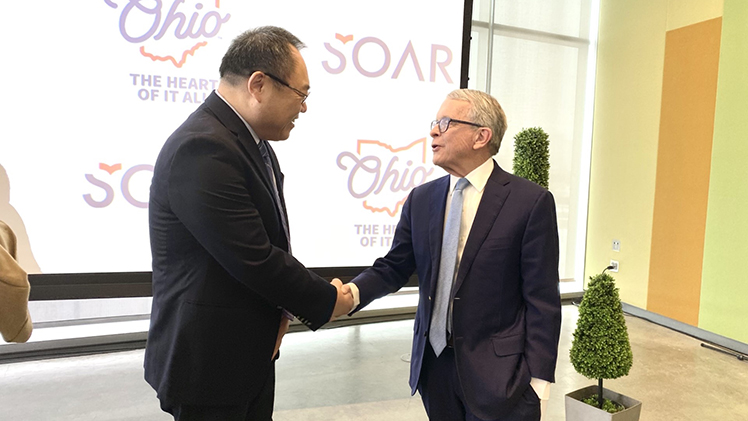The University of Toledo will play a key role in a statewide mental health research initiative aimed at identifying why some individuals are more resilient than others.
Funded by the Ohio Department of Mental Health and Addiction Services, the $20 million State of Ohio Adversity and Resilience Study is a first-of-its-kind project meant to help inform new treatment strategies to improve mental health across the state.

Dr. Xin Wang, a professor of psychiatry and neuroscience, is the State of Ohio Adversity and Resilience Study’s lead scientist at UToledo.
“There are a lot of studies that have focused on patients who have mental health challenges. There are very few studies that look at resiliency — what are the factors that help them get through difficult situations and difficult events,” said Dr. Xin Wang, a professor of psychiatry and neuroscience and the study’s lead scientist at UToledo. “This is a new kind of thinking in mental health research.”
UToledo is one of several leading Ohio academic institutions taking part in the project, which is being spearheaded by Ohio State University.
The State of Ohio Adversity and Resilience Study, or SOAR, launched earlier this year with a survey that includes questions about resiliency, substance abuse, depression, anxiety and other mental health conditions. Researchers hope it will be completed by as many as 15,000 Ohioans across all 88 counties.
In the study’s second phase, scientists at five sites across the state — including UToledo — will conduct advanced brain imaging, computer-based neuropsychological tests and collect blood samples from multiple members of the same family.
The idea, Wang said, is to be able to compare and contrast susceptibility and resiliency seen among individuals with similar genes, environmental and socioeconomic factors.
UToledo has received a $500,000 sub-award to fund its part of the research, which calls for collecting data from at least 210 individuals.
In total, the project aims to collect data of 3,600 people from 1,200 individual families across the five research sites.
“We are very excited to participate in a catchment study focused on Ohioans. This project has the potential to help people with one of their most fundamental needs — their health — by taking a close look at the factors that contribute to wellness and recovery,” said Dr. Robert Smith, professor and chair of the departments of neuroscience and psychiatry in the UToledo College of Medicine and Life Sciences, and a co-principal investigator leading this project at UToledo.
From survey responses and an analysis of biological factors, researchers hope to identify the root causes of the uptick in mental health disorders, suicide and overdose deaths observed statewide and to better understand the factors that lead to resiliency.
“Everyone experiences challenges in their life,” Wang said, “but we don’t fully know why some people are more resilient than others, particularly within the same family. Through this study, we hope to identify factors that can be modified to reduce risk and build resilience broadly across the population, reducing mental health and substance use disorders.”
Wang, whose research is primarily focused on post-traumatic stress disorder, also is hopeful the data collected through the SOAR project might yield clues about the development of PTSD and inform future PTSD research projects.
“Not only is this an important research project that will benefit people in northwest Ohio and across the state, but it’s also a chance for us to establish a deeper relationship with other prestigious research institutes in Ohio,” Wang said. “We see opportunities for future collaboration based on the work we’re doing here.”
UToledo is expected to begin gathering data from study participants in March.